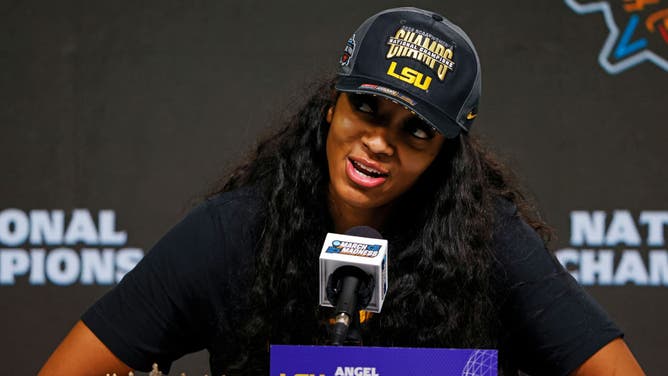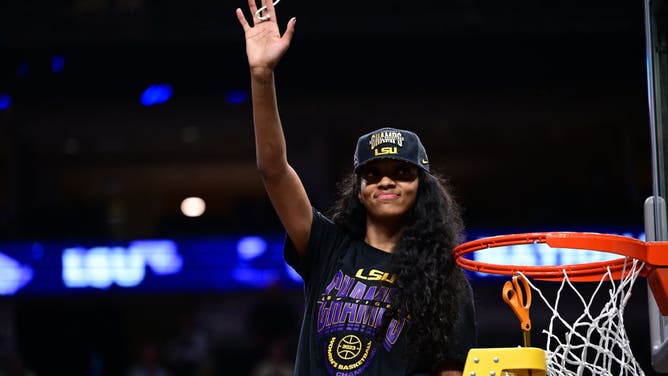Angel Reese Postgame Comments About Taunting Caitlin Clark Signal Larger Trend About Negative Direction Of American Society
Much has been written about Angel Reese taunting Caitlin Clark at the end of LSU's National Championship victory over Iowa.
While I believe Reese taunting Clark -- in the manner she did -- is pretty classless, that's not going to be the focus of this commentary. Though, ESPN has already deemed me racist for saying that.
No, I think the bigger issue is how she handled the postgame news conference. Not only how she handled it, but how the media is covering her comments.
Here's what Reese said when asked about her taunts:
All year, I was critiqued for who I was. I don’t fit the narrative. I don’t fit the box that y’all want me to be in. I’m too hood. I’m too ghetto. Y’all told me that all year. But when other people do it, and y’all don’t say nothing. So this is for the girls that look like me. For those that want to speak up for what they believe in. It’s unapologetically you. And that’s what I did it for tonight. It was bigger than me tonight. And Twitter is going to go into a rage every time. And I’m happy. I feel like I’ve helped grow women’s basketball this year.
Of course, the majority of media is fawning over her comments.
Harmless enough, right? Except I'm getting tired of the "for those who look like me" comments.
Why are we, as a society, so quick to applaud this type of language? First of all, what exactly constitutes "look like me"?
Angel Reese is a 6'3" 20-year-old woman. How many American women are 6'3"?
But she doesn't mean that, of course not. She simply means "black girls." But what is the message here? I'll tell you: the constant messaging is that we SHOULD be dividing ourselves by skin color.
That you should only seek role models who "look like you." That's a terrible message. Also, I'm certain other black girls have won NCAA Tournament National Championships and Most Outstanding Player awards, so I'm not sure what she's saying young, black girls should take away from her achievement.

DALLAS, TEXAS - APRIL 02: Angel Reese #10 of the LSU Lady Tigers speaks during a press conference after the LSU Lady Tigers beat the Iowa Hawkeyes 102-85 during the 2023 NCAA Women's Basketball Tournament championship game at American Airlines Center on April 02, 2023 in Dallas, Texas. (Photo by Ron Jenkins/Getty Images)
Another problem with her language is the "unapologetically me" nonsense that continues to permeate society.
We all act differently in different circumstances. There seems to be a common complaint -- and again, she's talking about race when she says this -- among the black community that people can't "be themselves" in American society.
And, don't take it from me. Shannon Sharpe broke it down on Undisputed.
"She said 'unapologetically me,' she means unapologetically BLACK," Sharpe said, with extra emphasis on that last word.
I heard this complaint a lot when I was working in corporate America, especially. That black colleagues felt uncomfortable being themselves at work. That employees had to try and "fit in" with "white culture."
But here's the dirty little secret: we all do that. I wear different clothes to work than I do when I'm hanging out with my friends.
I talk to my boss differently than I talk to my buddies over a beer. This is not a uniquely black experience. It's a human experience.
This is how society works: you speak to your grandmother differently than you speak to your friends.
But we keep beating this drum of victimhood, constantly. That we force black people to act differently, while white people are "unapologetically themselves."
I have news for everyone: society doesn't want ANYONE being unapologetically themselves at all times. Why? Because we're all, by nature, selfish creatures.
Nobody want you treating public places like you treat your own home. Sitting on an airplane is not the same as sitting on your couch. Don't kick your shoes off and put your nasty feet on the seat in front of you.
This is called SOCIETY. We all have to get along. Yes, you might have to act a little differently in public than you do it private. We all do. This does not make anyone special.
And that brings me to last point in her speech.
"It was bigger than me tonight."
The basketball game? Winning an NCAA Championship is cool, but it doesn't help anyone else. This idea that these events are so important to the greater good is unbelievable narcissism.

Angel Reese of the Louisiana State Tigers cuts down the net after their win over the Iowa Hawkeyes during the 2023 NCAA Women's Basketball Tournament National Championship. (Photo by Ben Solomon/NCAA Photos via Getty Images)
Angel Reese believes that her winning a basketball trophy is so much "bigger than ."Just think about that for a moment.
That's in line with all the self-aggrandizing craziness that is permeating our fragile society.
Lest you think I am attacking Angel Reese, I am not. She's no different than every athlete that promotes this talk. Not even just athletes.
But we're focusing on athletes mostly because they play a game. They're not changing the world.
But there's this desire to feel like you are changing the world, especially among the younger generation. So much so, that younger people assign great importance to things that just aren't that important.
Angel Reese "speaks up for what she believes in." Which would be what, exactly?
Again, this is a critique of the media. Nothing she said on that stage was particularly profound. But many are treating it like she cracked the code on humanity.
Here's a better message for Angel Reese to spread to the "girls who look like" her.
If you work really hard, practice every day, and give 100% effort: you will be successful.
See, that's America. And that's the America we should be promoting. I am certain that Angel Reese works very hard at basketball.
But instead of talking about the work, she plays the victim card.
And she said all the right things that people are going to eat up. She's going to get paid. The new social media followers and the "likes" are piling up. The money comes next.
That's good for Angel Reese. But it doesn't help anyone else. In fact, that kind of talk only hurts the overall goals for our society.
Let's not pretend that it doesn't.
You know what, she's right. This is bigger than her. Because it's not an Angel Reese problem.
It's an American society problem.